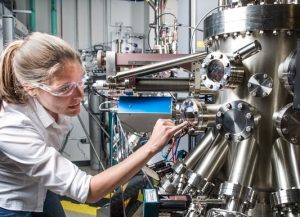 Cryogenic service can be harsh on any equipment, but gaskets have their own specific challenges. Due to the expansion and contraction when temperatures fluctuate between room and cryogenic, gasket sealing mechanisms can be compromised. This newsletter provides answers to issues facing gaskets in cryogenic service.
Cryogenic service can be harsh on any equipment, but gaskets have their own specific challenges. Due to the expansion and contraction when temperatures fluctuate between room and cryogenic, gasket sealing mechanisms can be compromised. This newsletter provides answers to issues facing gaskets in cryogenic service.

How do cryogenic temps affect gaskets?
Cryogenic temperatures lower the ductility and increase the hardness/brittleness of metallic, semi-metallic & polymer gaskets. Lower ductility can result in breakage, improper sealing and failure.
 What’s the result of cryogenic temps on spiral wound, camprofile, or other semi-metallic gaskets?
What’s the result of cryogenic temps on spiral wound, camprofile, or other semi-metallic gaskets?
These traditional metallic gaskets are not optimally constructed for cryogenic service. The cryogenic temperatures lower their ductility and increase their hardness which causes reduces their flexural properties and in turn results in the loss of a leak tight seal.
 Why do Special Fasteners China.’s Revoseal gaskets perform better in cryogenic temperatures?
Why do Special Fasteners China.’s Revoseal gaskets perform better in cryogenic temperatures?
Revoseal gaskets take into consideration the harsh cryogenic service requirements in their materials of construction and unique designs. Revoseal gaskets have been optimized to act like a spring, even at cryogenic temperatures. This maximizes the flexural properties gaskets need in cyclic environments because the gasket dynamically responds to expanding and contracting joints. In addition, Revoseal gaskets can be constructed from nickel alloys to improve ductility. Finally, Revoseal’s design (the metal-to-metal seal in combination with a PTFE / graphite soft seal) require lower sealing force compared to graphite or spiral wound gaskets.
 How long can a Revoseal gasket last in cryogenic temps vs. other semi-metallic gaskets?
How long can a Revoseal gasket last in cryogenic temps vs. other semi-metallic gaskets?
Revoseal’s improved flexural design is key for Revoseal’s low leak rates in cryogenic service. The Revoseal gaskets will far outlast traditional all metal or spriral wound gaskets in steady cryogenic service. In addition, Special Fasteners China.’s Revoseal gaskets typically provide an order of magnitude lower leak rate compared to other metallic seal designs like the camprofile or spiral wound.
If the cryogenic service is not steady state and the pressure, vacuum or temperature fluctuates significantly, standard metallic gaskets may crack or not be able to compensate for the amount of expansion and contraction resulting in high leak rates. Revoseal gaskets will consistently out-perform these standard gaskets in all aspects required for non-steady state cryogenic service conditions.
Revoseal Case Study Anorganic Chemical
Overview
Production of polychlorinated fluoridic hydrocarbonates – Commonly used for refrigerant fluids and pharmaceutical propellants.
Process Conditions
Media: HF, CH, Oxygen, and R134a/R133a; Temperatures of -200 C to 430 C. Pressures of vacuum to 160 bar
Benefits
The advantages accomplished with Revoseal ECO+ gaskets extended the lifetime to 5 years compared to 3-9 months using a traditional spiral wound gasket. This allowed the company to easily reach their annual outage goals to inspect and replace when necessary, rather than experience unexpected outages.
